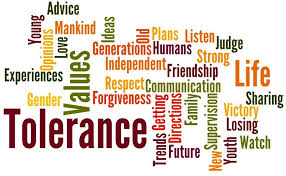
There is little question that tolerance as a concept can have mixed connotations depending on the power balances and relative agency of those encouraged to tolerate and those tolerated. As Peter Worley of the Philosophy Foundation said, “if I hear something objectionable or indefensible, then my duty is not to tolerate it but to say why I think its objectionable or wrong, and to persuade others to accept my view (in as far as the view is defensible itself).”
For many of us, that would seem a self-evident approach – if you disagree with something offensive then you should stand up to it, argue your point and hope to persuade the other. Yet political engagement today seems to have evolved to a place where no one side is capable of listening to the other, let along engaging with opposing arguments.
The debate in the US has not been about the issues but rather about the characters of the candidates – to the detriment of argument and discussion, let alone consideration of evidence. Both conservatives and liberals seem deadlocked and there seems little room for compromise – increasingly they can’t even seem to talk to each other.
Hillary Clinton is accepted to be untrustworthy despite many investigations clearing her name. Trump said he could shoot someone on 5th Avenue and his supporters wouldn’t turn on him. Does that sound like a sane basis for deciding the future of the United States?
The recent Brexit vote suggests that the UK is suffering the same problem. There are many issues that many felt had been ignored by traditional politics from the growing gap between rich and poor, the failure of the social contract, immigration and more. Some saw the divide in the country as one between London, Scotland, Northern Ireland and the rest of the country. Yet outright lies were told throughout the campaign, with neither side believing the other while in full support of their own side's dissembly.
Technology is also evolving; there is growing discussion of the algorithms used by Google and Facebook to provide users with items of interest in social media. There is concern that people are increasingly only seeing news and information that already conforms to their world view – an echo chamber of existing fears and ignorance. We are inadvertently becoming more entrenched in our own ways, less enlightened, less flexible, less tolerant.
The Institute of Development Studies has argued there is tendency within society- a response to social change- that sees voters prioritise a desire for more order in society, greater homogeneity and stronger, more aggressive leaders.
Whatever the reason behind this shift towards aggression and hostility, we need to find new ways of communicating the goals and perspectives of peoples with different ideas about the world. We need to remember that everyone has their reasons for their beliefs, and we should remember and respect our shared humanity. Each side needs to listen more if we are to find ways of preserving a sense of respect for others, no matter their political position.
Ghandi himself said, “I do not like the word tolerance, but could not think of a better one. Tolerance implies a gratuitous assumption of the inferiority of other faiths to one.”
What we are doing with the ToDay Campaign is encouraging the youngest members of society, not to think of anything as inherently inferior, but simply to question the assumptions that permeate their lives.
If we can persuade a generation of children to think critically about what they’re being told, and be open to learning about and listening to others, then we have the chance to maintain a society built on respect, compassion and dialogue.
 RSS Feed
RSS Feed